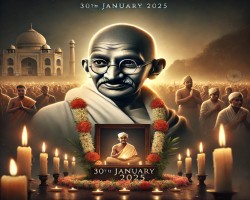UPSC Current Affairs
| Important Days |
|---|
|
|
|
Why in the news?
Every year on January 30, we honour the life and legacy of Mahatma Gandhi, the guiding light of India’s struggle for independence. This day, observed as Martyrs’ Day or Shaheed Diwas, marks a moment of reflection on the profound sacrifices made in the pursuit of freedom. It is a solemn reminder of the tragedy that unfolded in 1948 when the man who championed peace and non-violence was silenced by Nathuram Godse. Martyrs’ Day Date: Annually, January 30 is observed as Martyrs’ Day to commemorate the death anniversary of Mahatma Gandhi. On this day in 1948, Gandhi was assassinated in the Birla House compound in New Delhi, after one of his regular multi-faith prayer meetings. Nathuram Godse, a member of the Hindu Mahasabha who opposed Gandhi’s views on the partition of India, fired three bullets at him, ending his life instantly. Gandhi’s last words, as recounted, were “Hey Ram". Martyrs’ Day History: The events of January 30, 1948, remain etched in the nation’s memory. On that day, as Gandhi made his way to an evening prayer meeting at Birla Bhavan in Delhi, he was accompanied by his grandnieces. Nathuram Godse, a Hindu nationalist, confronted him and fired three shots into his chest. Gandhi died on the spot. Every year since, Indians remember this tragic loss by observing Mahatma Gandhi Punyatithi, honouring his unparalleled contribution to the nation. Martyrs’ Day Significance: Mahatma Gandhi’s influence extended far beyond India’s independence struggle. He was a global advocate for peace, non-violence, and justice. Through his leadership in movements like the Non-cooperation Movement, Civil Disobedience Movement, Khilafat Movement, Quit India Movement and Champaran Satyagraha, Gandhi united millions under the banner of truth and non-violence. His Salt Satyagraha in 1930, a march from Sabarmati Ashram to Dandi, remains a historic symbol of resistance. Observing Martyrs’ Day reminds us to uphold these values in our own lives, striving for a society built on harmony and mutual respect. Facts about Mahatma Gandhi: Full Name – Mahatma Gandhi's full name was Mohandas Karamchand Gandhi. He was born on October 2, 1869, in Porbandar, India. Father of the Nation – He is widely regarded as the "Father of the Nation" in India for his role in India's struggle for independence from British rule. Philosophy of Non-Violence – He strongly believed in Ahimsa (non-violence) and Satyagraha (truth and civil disobedience), which became the foundation of India's freedom movement. Role in Indian Independence – Gandhi played a key role in major movements like the Non-Cooperation Movement (1920), Civil Disobedience Movement (1930), and Quit India Movement (1942) against British rule. Dandi March (Salt Satyagraha) – In 1930, he led the Dandi March, a 240-mile walk to protest against the British salt tax, which became a symbol of resistance. Simple Living – Gandhi lived a very simple life, wore khadi (hand-spun cloth), and promoted self-reliance through the Swadeshi Movement. Time in South Africa – Before returning to India, Gandhi spent 21 years in South Africa, where he fought against racial discrimination and developed his principles of Satyagraha. Imprisonment – He was jailed multiple times by the British authorities for leading protests and movements against their rule. Assassination – On January 30, 1948, Gandhi was assassinated in New Delhi by Nathuram Godse, who opposed his views on Hindu-Muslim unity. Legacy – His teachings of non-violence inspired many global leaders, including Martin Luther King Jr., Nelson Mandela, and the Dalai Lama. His birthday, October 2, is celebrated as Gandhi Jayanti in India and International Day of Non-Violence worldwide. Note: Martyr's Day is observed to honor the sacrifices of those who gave their lives for India's freedom. Key dates include January 30 for Gandhi, March 23 for Bhagat Singh, and others, inspiring national unity, reflection, and future generations to uphold the values of justice and patriotism. |
| >> More UPSC Current Affairs |
